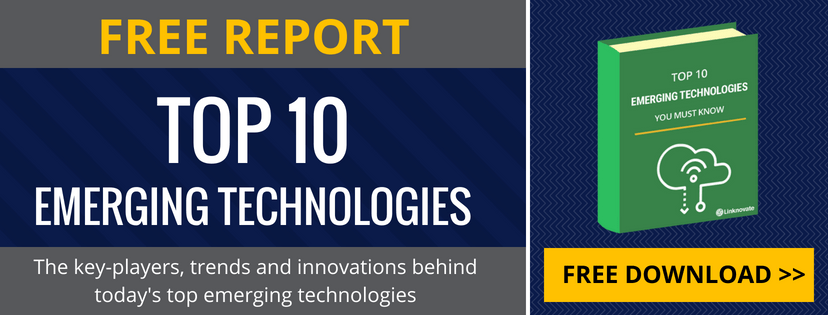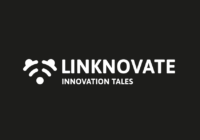Companies like Apple, Microsoft or Google want to gather as much as their users’ data while complying with privacy regulations. Here we analyze the Differential Privacy leaders that are making this technology available at scale.
In the age of big data analysis and machine learning, there is no doubt that collecting personal and behavioral user information is crucial to making good software and improving the user experience. But at the same time, privacy concerns and violations are more and more in the spotlight of society and regulators.
Differential Privacy comes as a solution that suits both sides. It is a new model of cyber security that works with aggregated user data to extract patterns of behavior while keeping the data of individual users entirely private for the company as well as hackers and intelligence agencies.
No wonder why tech corporations are betting and researching into this technology that will allow them to better know their users while complying with the most strict regulations (like GDPR). And in this analysis, we list the top differential privacy leaders worldwide that are making this technology deployable at scale.
Top Organizations in Differential Privacy
Taking into account the aggregated set of data Linknovate has aggregated for Differential Privacy, the most active organizations are SMEs and startups (43%). Universities follow with 36% of all entities.
However, when looking at the top 10 organizations, the top three are American tech corporations, while the rest are universities (6 American and 1 Chinese). These American universities, primarily, occupy such high positions in our ranking because they have been awarded a considerable amount of public funding.
For example, Cornell University has been awarded grants worth almost $2M. They are developing differential privacy in small data applications and privacy by design strategies for ICT. Besides, and in collaboration with Yahoo, they research search engines and information networks’ privacy guarantees.
Another example is Carnegie Mellon University. They try to develop scalable methods of data exchange that preserve privacy. They also have been awarded an NSF grant to investigate how privacy expectations change across varying contexts.
| Name | Score | Pubs | Confs | Grants | Patents | TMs | News | Web |
 |
144.6 | 13 | 52 | – | 4 | – | 14 | – |
 |
101.5 | – | – | – | 2 | – | 2 | – |
 |
81.0 | – | 4 | – | 3 | – | 1 | – |
 |
80.2 | 6 | 41 | 4 | – | – | 2 | – |
 |
75.1 | 11 | 6 | – | – | – | – | – |
 |
62.9 | 11 | 24 | 3 | – | – | – | – |
 |
60.5 | 6 | 33 | 1 | – | – | – | – |
 |
60.3 | 13 | 23 | 2 | – | – | 4 | – |
 |
55.6 | 16 | 26 | 3 | – | – | – | – |
 |
50.1 | 4 | 20 | 7 | – | – | 2 | – |
Top 10 entities worldwide leading the innovations and advancements in Differential Privacy. Source: Linknovate.com
NOTE: Since we are constantly updating our data, results may vary. Click on the link above for more updated results.
Top 5 Differential Privacy Leaders
American corporations lead the differential privacy advancements and research. And Microsoft is the one putting the most significant effort into improving and researching into this technology. They have several patents and publications on geometric response systems and algorithms to preserve privacy.
For its part, Apple has a recent patent application on differential privacy for message text content mining. And SAP works on the detection of atypical values that preserve privacy for data flows.
Two universities close the top 5 organizations worldwide in differential privacy. Chinese Wuhan University focuses on mobile communications applied to the detection of trajectories and securely transmitting IoT data. And in the USA, the University of Pennsylvania has been awarded several grants for differential privacy, cyber-physical security, and privacy systems.
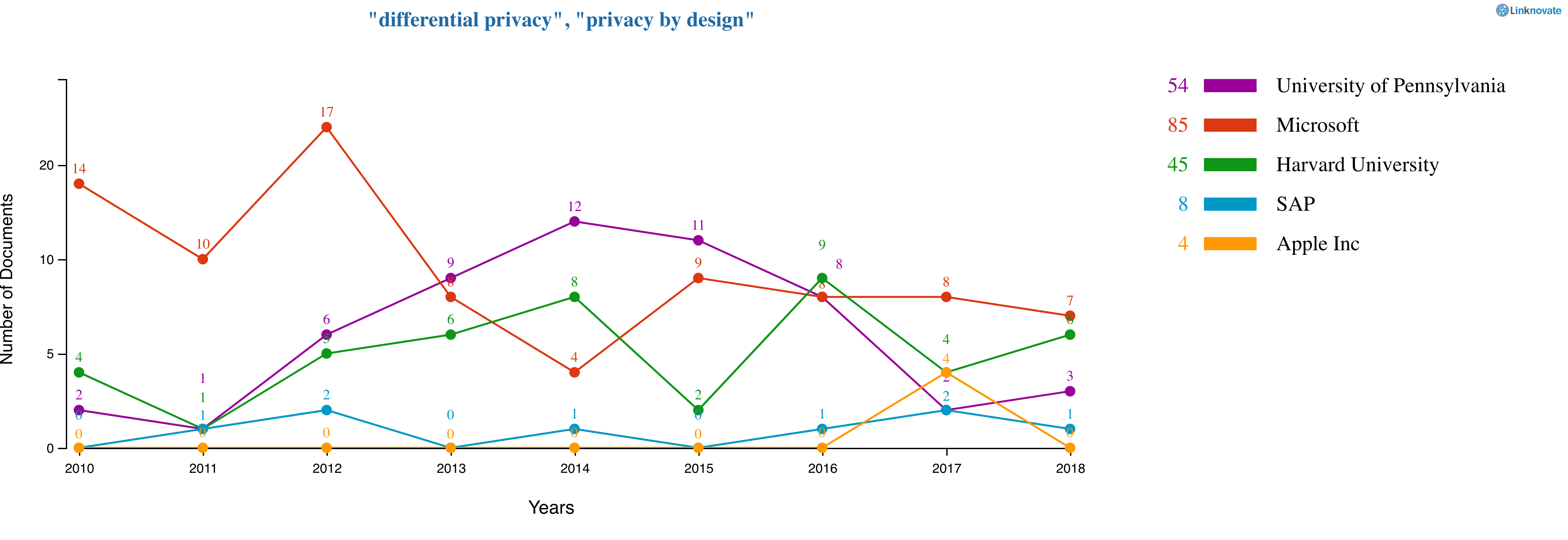
Source: Linknovate.com
Countries Leading the Advancements in Differential Privacy
The USA has an undisputed leading position in Differential Privacy and Privacy by Design. Not only in Academia but most significantly in the Industry. Europe follows, with countries like the United Kingdom and Germany occupying the third and fourth positions respectively.
Some important, well-known players working on noise adding mechanisms and algorithms are Google and IBM. The latter also works on PPFA (Privacy-Preserving Fog-enabled Aggregation) in Smart Grid, a system enabled to operate in fog computing.
From China, State Grid Corporation of China and Baidu collaborate with Wuhan University in the development of a two-phase algorithm for differentially private frequent subgraph mining. And Huawei participates in the winning consortium of the European project LASIE (€11M). Following a privacy-by-design approach, they will ensure all functionalities and forensic data of the project will strictly obey all legal and ethical restrictions and national laws.
Some other interesting examples come from Spain. The Technical University of Madrid has several works on engineering privacy and security by design and on data privacy in smart electrical networks. And are collaborating with Atos, TRIALOG, and the University of Vigo.
And finally, in Belgium, the COSIC department of the Catholic University of Leuven is developing advanced cybersecurity solutions to protect data and user privacy in the cloud and in the Internet of Things (IoT). They collaborate with Thales Alenia (France), the University of Málaga (Spain), and the Austrian Institute of Technology (Austria) for protecting payment data (in finance and mobile payments) and the data of patients (in healthcare).

Source: Linknovate.com
Differential Privacy Trends
As technology in full growth, all its related subtopics are gaining importance. But the main trend in differential privacy has to do with algorithms. In this field, TRIALOG (Austria) is coordinating the PARIS Project (€5M). They will define and demonstrate a methodological approach for the development of surveillance infrastructure to enforce the right of citizens for privacy.
For its part, LeapYear (USA) has raised $12.6M since 2016. They work on and have patented methods for differentially private processing and database storage.
Also with relevant patents, Aztrix (Belgium) is poised to be one of the key companies in the next years, thanks to its works on design privacy and its operational methods.
A company also growing in importance is GridPocket (France). They have been awarded an SME instrument phase 1 for a Home Energy Efficiency Platform with an interesting “privacy-by-design” data protection concept. They also are part of DEFeND project (€3.3M), that will deliver a platform for empowering organizations to follow and comply with GDPR (General Data Protection Regulation) policies.
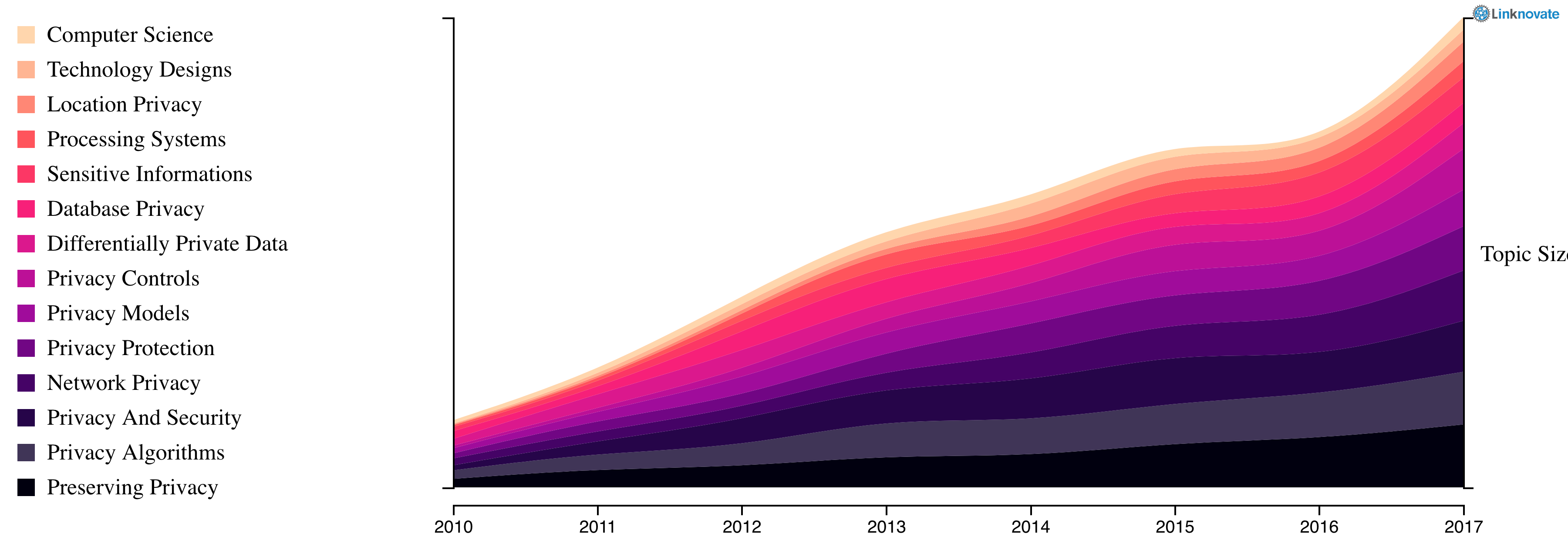
Source: Linknovate.com
Evolution of Differential Privacy
Data privacy will become more and more important during the following years, and differential privacy is one of the related fields that will follow the trend. Given the growth experienced in recent years and as more tech leading companies start working in the area, it is expected to keep the pace.
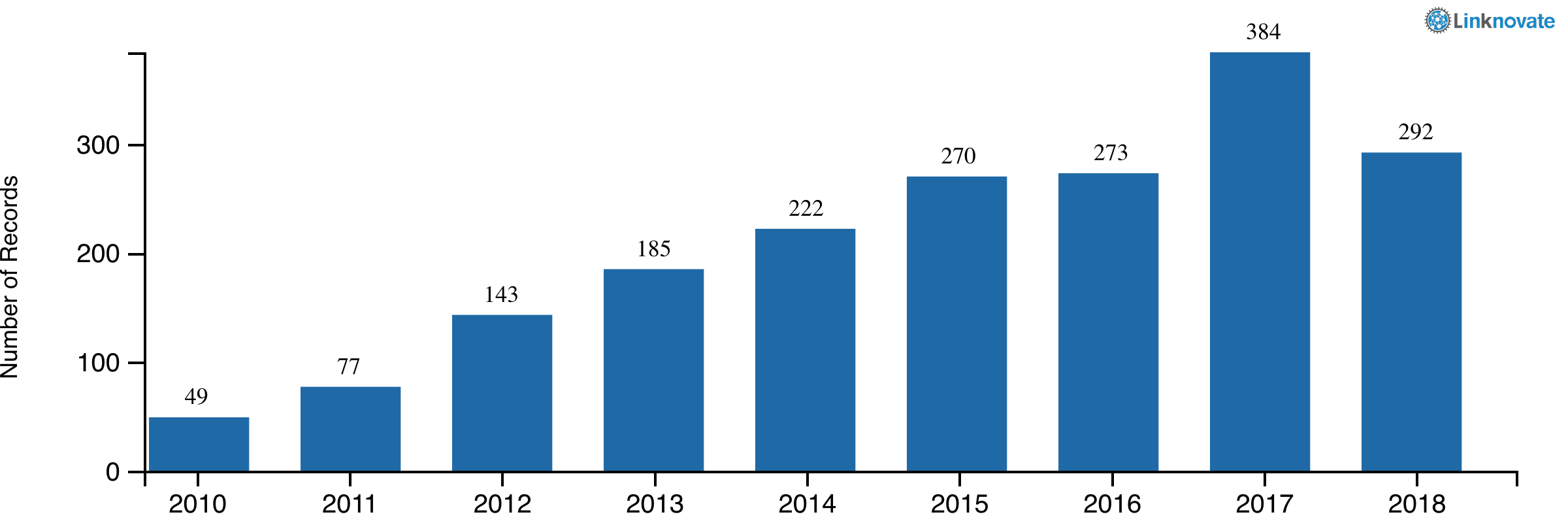
Source: Linknovate.com
This was made possible thanks to support by GAIN agency through InnovaPeme 2017.





